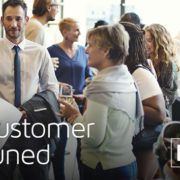Why is Trust key in Financial Services?
Why is Trust key in Financial Services?
The financial services sector shows no signs of slowing down, a lack of challengers, disruptors or a change in its highly competitive nature. At the heart of this sector is a requirement to trust and be trusted – this sector needs to have trust embedded as its DNA.
Let’s look at why is trust key in financial services.
The end customer is paying a premium, or investing, for a ‘paid for promise’
- Insurance: Until a claim is made
- Wealth: until retirement or draw down
Therefore, much of the relationship focus revolves around the paid for promise. Providing a reassurance that your money is safe with us – either to deliver the growth rates necessary to secure your retirement or investment return; or swift payment and prompt service to cover a claim.
The relationship is based around intangible trust at this stage and it only tips into tangible ‘active’ trust when the promise needs to be paid. So, the dilemma for this sector is the development of trust when much of the relationship remains intangible or in that intentional state. This is why it makes it important that there is trust in financial services.
Unfortunately, from time to time the paid for promise fails to meet the intentions and expectations or fails completely. A good example that springs to mind would be Equitable Life (the market leading UK life assurer that saw many of its policyholders lose half of their savings after over promising investment returns that it just couldn’t maintain when the market took a downturn) – ouch! This damage to trust doesn’t just affect the impacted customers, but the wider view of the industry too.
This is why Trust is Key in Financial Services
How can we make sure this doesn’t happen and relational trust is ring-fenced – becoming our competitive advantage?
The obvious areas from the Trust DNATM that come to the fore are:
- Intention and relational purpose
- The demonstration of integrity, reputation, value & ethics and culture that provide the other side with the right assurances that by making themselves vulnerable it won’t be misplaced.
- A track record of previous satisfied customers, honouring of commitments and consistency are also positive trust builders.
- Are your processes and systems trust builders or internally driven risk mitigators?
- When interacting with you, do I receive an experience that doesn’t see me as a liability or risk that needs to be quickly passed on?
Ways to build trust
- Get to know the needs, wants of your key customers and put yourself in their shoes. Consider their wider challenges and what keeps them awake at night – how can we help them?
- Adapt or develop your proposition to help solve these problems – don’t just ‘sell a product’ with standard features
- To support this, demonstrate your capability and competency – get them to meet your wealth team or claims team – the people that count when the rubber hits the road.
- Make sure all of your people know what they need to do in order to develop trust. This is mission critical – one slip and if trust is fragile, it will shatter.
- Share strategic information and insights in collaborative / joint working session to explore additional mutual value opportunities. It reinforces and validates the faith you put int the relationship and the act of making yourself vulnerable.
Is trust in financial services just a people thing?
- Yes & no!
People are important in the early stages of the relationship. They build rapport, understanding and provide a tangible touch point to relational intention. At this stage the relationship is likely to be 70% emotional, focused on the personalities involved, what they say, the attitude and behaviours – do we like each other and do they live up to what they say.
However, over time it moves to be more integrated and knowledge / information based. There gets to a point when more people need to get involved to keep the relationship moving forward, developing and bringing in new ideas and approaches. It is really important that:
- The initial gate-keeper / relationship developer transitions into the relationship enabler and doesn’t hold on or the relationship will get stuck and start to leak value.
- The people coming into the relationship understand the vision, aims, objectives, role they play in its success, relationship values, ethics, attitudes and behaviours. A relationship charter is really helpful, supported by a champion led communication and contact strategy.
- The people making the big decision meet the people that will ultimately make the paid for promise a reality if required. How many times do you bring in your claims teams into the front-end customer / broker engagement?
Why building trust in financial services will make your company stand out.
If you do this properly then the relationship becomes more than the individuals involved and develops interdependence. Where both sides rely on and trust each other to create mutual value, more than the sum of the individual parts.
Opportunities to engage and build relational trust may be limited – however, continually look for ways to provide reassurance that my ‘paid for promise’ is in good hands. E.g. during the renewal cycle in insurance, there is an opportunity to be pro-active in re-establishing customer needs or exploring if needs and circumstances have changed.
A positive human interface is also important when a customer checks in, has a question or needs something related to their investment or policy. It is vital that each of these is viewed as a potential trust builder and trust re-assurer.
With the financial services sector continuing to intensify, make your paid for promise your competitor advantage.
![]() Do you need to develop trust in your business? Please get in touch if you’d like to discuss further any of the points raised in this blog.
Do you need to develop trust in your business? Please get in touch if you’d like to discuss further any of the points raised in this blog.
Learn more about Dr Mark Hollyoake
Click to read: The Trust Dividend by Dr Mark Hollyoake, featured in The International Journal of Sales Transformation.
- Leap of Faith by Dr Mark Hollyoake featured in the Journal of Sales Transformation - May 13, 2024
- Stop hiding behind your computer and get out to see your customers! - March 6, 2024
- B2B Trust Research: What are Boundary Spanners? - January 31, 2024


